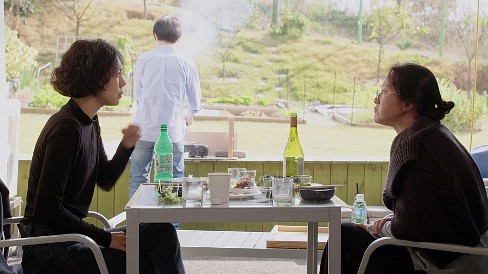
 A married woman visits three friends in the city, and we are inspired to consider what is the nature of happiness for women in a “man’s world.”
A married woman visits three friends in the city, and we are inspired to consider what is the nature of happiness for women in a “man’s world.”
An undesirable side-effect of watching lots of Hollywood movies is that we become used to films that try for big, splashy effects—blockbusters and self-important message films, full of noise and drama. We’re not used to smaller scale modest efforts; we have trouble noticing subtlety and nuance. The films of Korean director Hong Sang-soo tend to fly under the mainstream radar. But there’s hidden treasure here.
His latest picture is called The Woman Who Ran. We meet Gam-hee, a married woman played by the warmly expressive Kim Min-hee. Since she got married, she’s never spent a day apart from her husband, but now he’s on a business trip, and she travels to Seoul to visit some old friends. Her friend Young-soon is divorced, living in an apartment complex with a roommate. They have a garden and some chickens, and Young-soon is mostly content with her life. The dinner conversation ranges widely, from the trials of getting older to philosophical subjects. At one point, the roommate describes how the rooster they have jumps on the backs of hens, pecking at them mercilessly, just to show, according to her, that he’s important. This small detail is part of a larger pattern in which women acknowledge men and relationships as problematic.
Gam-hee then stays with another friend in town, a Pilates instructor still trying to find her vocation in life. Their conversation is a bit more guarded, but also revealing. The friend is having an affair with a married man, a fact that emphasizes her tenuous self-image. Then, by chance, Gam-hee runs into the wife of an artist that she herself used to be with. Although the possibility of regret is in the air, the two are able to talk about their situations as grown-ups, and when the husband shows up, it’s not really a surprise to find that he’s kind of a clueless and self-centered guy.
Hong is a master of the “ordinary.” He can take the merest wisp of a story and create a gentle naturalistic slice-of-life movie like this. His editing flow and relaxed narrative rhythm are as comfortable as a well-worn pair of sandals, and I think this opens up the possibility for viewers of insight into the characters in particular, and questions about happiness in general. What does it mean for each woman? And how is it affected by living in what we are used to calling a “man’s world”? The title, The Woman Who Ran, refers apparently to someone mentioned in one of the conversations, a minor character, whom we never see, and whose actions pose a question that is never answered. Then again, I think it points obliquely to Gam-hee herself, who escapes temporarily from the security of married life to learn about herself by checking in with friends from her past.
28 feature films in 25 years. That’s the astonishingly prolific career of Hong Sang-soo. He writes and directs movie like Stephen King writes books, although in all other respects their work is very different. Hong can do this because he doesn’t try to please anyone but himself with his low-key, intelligent, personal dramas about people interacting with one another in ordinary settings. The relationships of men and women are always one of the subjects, painted in shades of uncertainty. The Woman Who Ran is one of his more inspired artistic efforts, direct and simple, yet thought-provoking. For Hong, and for those who enjoy his movies, less is definitely more.

